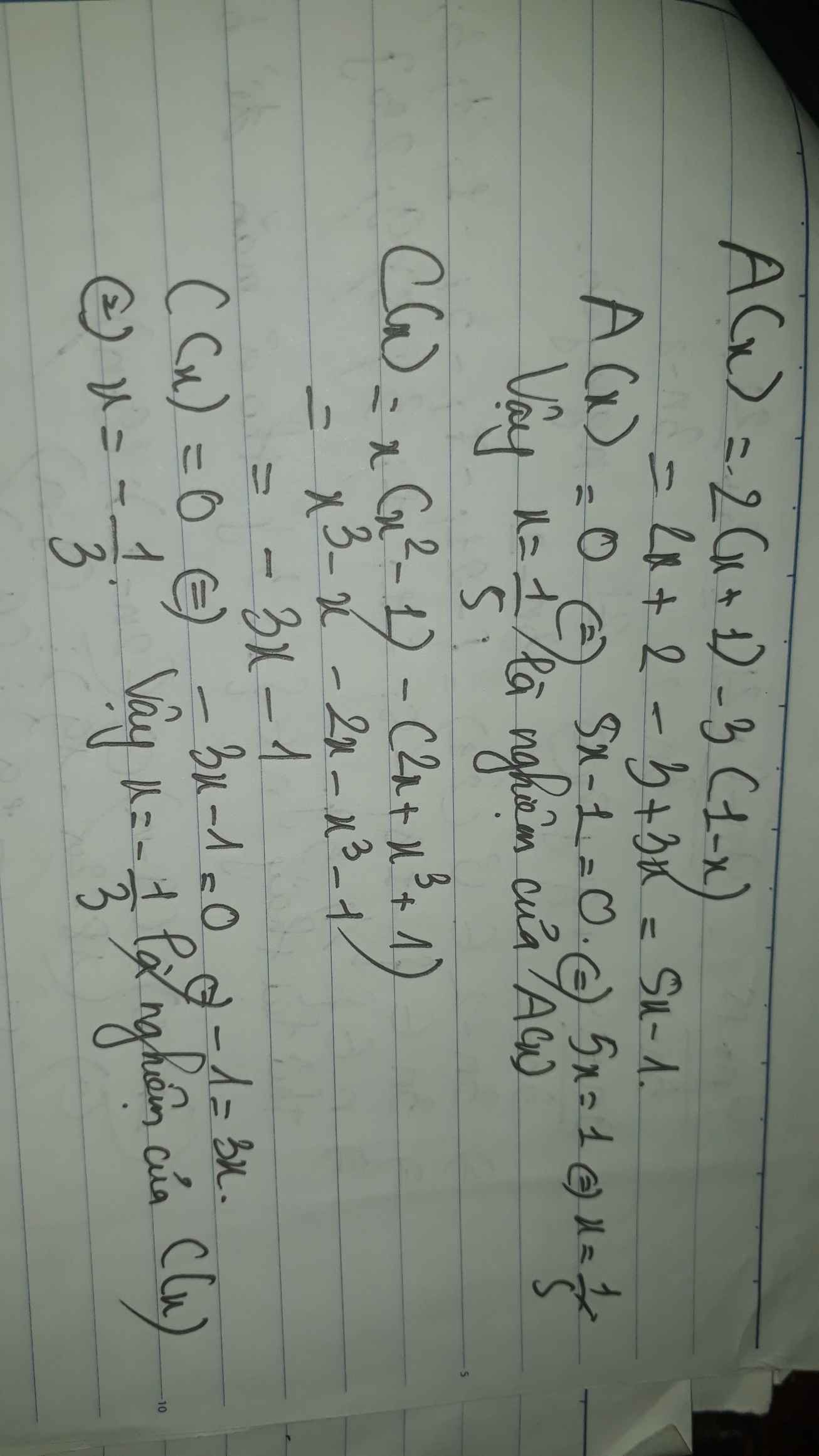Tìm nghiệm của (x-1) (x -2) ( x-3) + (x+1) (x+2) (x+3) - 2x^3 = 41
Hãy nhập câu hỏi của bạn vào đây, nếu là tài khoản VIP, bạn sẽ được ưu tiên trả lời.


A(x) = 2x+2-3+3x
A(x) = 5x-1
C(x) = x3 -x - 2x - x3 - 1
C(x) = x - 1
Đúng thì like giúp mik nha bạn. Thx bạn

\(P\left(x\right)+Q\left(x\right)=0\Leftrightarrow x^3-2x^2+3x+4-x^3+2x^2-2x-1=x+3=0\)
\(\Leftrightarrow x=-3\)

a) \(x=\dfrac{25}{72}\)
b)\(x=-\dfrac{1}{4}\)
\(x=\dfrac{3}{2}\)
c)\(x=\dfrac{5}{4}\) hoặc
x \(=\dfrac{8}{5}\)
d và e chịu vì mk kg giỏi lắm về mũ
f)\(x=-2\)
G)\(x=-\dfrac{5}{12}\)

a)Đặt A (x) = 0
hay \(3x-6=0\)
\(3x\) \(=6\)
\(x\) \(=6:3\)
\(x\) \(=2\)
Vậy \(x=2\) là nghiệm của A (x)
b) Đặt B (x) = 0
hay \(2x-10=0\)
\(2x\) \(=10\)
\(x\) \(=10:2\)
\(x\) \(=5\)
Vậy \(x=5\) là nghiệm của B (x)
c) Đặt C (x) = 0
hay \(x^2-1=0\)
\(x^2\) \(=1\)
\(x^2\) \(=1:1\)
\(x^2\) \(=1\)
\(x\) \(=\overset{+}{-}1\)
Vậy \(x=1;x=-1\) là nghiệm của C (x)
d) Đặt D (x) = 0
hay \(\left(x-2\right).\left(x+3\right)=0\)
⇒ \(x-2=0\) hoặc \(x+3=0\)
* \(x-2=0\) * \(x+3=0\)
\(x\) \(=0+2\) \(x\) \(=0-3\)
\(x\) \(=2\) \(x\) \(=-3\)
Vậy \(x=2\) hoặc \(x=-3\) là nghiệm của D (x)
e) Đặt E (x) = 0
hay \(x^2-2x=0\)
⇔\(\left[{}\begin{matrix}x^2-2x\\\left(x-2\right)x\end{matrix}\right.\)
⇒\(\left(x-2\right)x\)
⇔ \(x.\left(2x-1\right)=0\)
⇔ \(\left[{}\begin{matrix}x=0\\2x-1=0\end{matrix}\right.\)
\(\left\{{}\begin{matrix}x=0\\x=2\end{matrix}\right.\)
Vậy \(x=0\) hoặc \(x=2\) là nghiệm của E (x)
f) Đặt F (x) = 0
hay \(\left(x^2\right)+2=0\)
\(x^2\) \(=0-2\)
\(x^2\) \(=-2\)
\(x\) \(=\overset{-}{+}-2\)
Do \(\overset{+}{-}-2\) không bằng 0 nên F (x) không có nghiệm
Vậy đa thức F (x) không có nghiệm
g) Đặt G (x) = 0
hay \(x^3-4x=0\)
⇔\(\left[{}\begin{matrix}x^3-4x\\\left(x-4\right)x^2\end{matrix}\right.\)
⇒ \(\left(x-4\right)x^2=0\)
⇔ \(x.\left(4x-1\right)=0\)
⇔\(\left[{}\begin{matrix}x=0\\4x-1=0\end{matrix}\right.\)
\(\left\{{}\begin{matrix}x=0\\x=\dfrac{1}{4}\end{matrix}\right.\)
Vậy \(x=0\) hoặc \(x=\dfrac{1}{4}\) là nghiệm của G (x)
h) Đặt H (x) = 0
hay \(3-2x=0\)
\(2x\) \(=3+0\)
\(2x\) \(=3\)
\(x\) \(=3:2\)
\(x\) \(=\dfrac{3}{2}\)
Vậy \(x=\dfrac{3}{2}\) là nghiệm của H (x)
CÂU G) MIK KHÔNG BIẾT CÓ 2 NGHIỆM HAY LÀ 3 NGHIỆM NỮA

a) \(x-\sqrt{2x+3}=-2x\)
\(\Leftrightarrow\sqrt{2x+3}=x+2x\)
\(\Leftrightarrow\sqrt{2x+3}=3x\)
\(\Leftrightarrow2x+3=9x^2\)
\(\Leftrightarrow9x^2-2x-3=0\)
\(\Rightarrow\Delta=\left(-2\right)^2-4\cdot9\cdot\left(-3\right)=112>0\)
\(\Leftrightarrow\left[{}\begin{matrix}x_1=\dfrac{2+\sqrt{112}}{18}=\dfrac{1+2\sqrt{7}}{9}\\x_2=\dfrac{2-\sqrt{112}}{18}=\dfrac{1-2\sqrt{7}}{9}\end{matrix}\right.\)
b) \(\dfrac{1}{x}=1-\dfrac{1}{x+1}\) (ĐK: \(x\ne0,x\ne-1\))
\(\Leftrightarrow\dfrac{1}{x}+\dfrac{1}{x+1}=1\)
\(\Leftrightarrow\dfrac{x+1}{x\left(x+1\right)}+\dfrac{x}{x\left(x+1\right)}=1\)
\(\Leftrightarrow\dfrac{x+1+x}{x\left(x+1\right)}=1\)
\(\Leftrightarrow\dfrac{2x+1}{x^2+x}=1\)
\(\Leftrightarrow2x+1=x^2+1\)
\(\Leftrightarrow x^2-2x=0\)
\(\Leftrightarrow x\left(x-2\right)=0\)
\(\Leftrightarrow\left[{}\begin{matrix}x=0\left(ktm\right)\\x-2=0\end{matrix}\right.\)
\(\Leftrightarrow x=2\left(tm\right)\)
c) \(\dfrac{2}{\sqrt{x+3}}=\dfrac{1}{\sqrt{x^2-9}}\) (ĐK: \(x\ge3\))
\(\Leftrightarrow2\sqrt{x^2-2}=\sqrt{x+3}\)
\(\Leftrightarrow\sqrt{4\left(x^2-9\right)}=\sqrt{x+3}\)
\(\Leftrightarrow4\left(x^2-9\right)=x+3\)
\(\Leftrightarrow4x^2-36=x+3\)
\(\Leftrightarrow4x^2-x-36-3=0\)
\(\Leftrightarrow4x^2-x-39=0\)
\(\Rightarrow\Delta=\left(-1\right)^2-4\cdot4\cdot\left(-39\right)=625>0\)
\(\Leftrightarrow\left[{}\begin{matrix}x_1=\dfrac{1+\sqrt{625}}{8}=\dfrac{13}{4}\left(tm\right)\\x_2=\dfrac{1-\sqrt{625}}{8}=-3\left(ktm\right)\end{matrix}\right.\)

a) Ta có: f(x)=-3
<=>x5-2x2+x4-x5+3x2-x4-3+2x=-3
<=>(x5-x5)+(-2x2+3x2)+(x4-x4)+2x-3=-3
<=>x2+2x-3=-3
<=>x2+2x=0
<=>x(x+2)=0
<=>x=0 hoặc x+2=0
<=>x=0 hoặc x=-2
Vậy..........
b)đa thức f(x) có nghiệm
<=>f(x)=0
<=>x2+2x-3=0
<=>x2+3x-x-3=0
<=>x(x+3)-(x+3)=0
<=>(x-1)(x+3)=0
<=>x-1=0 hoặc x+3=0
<=>x=1 hoặc x=-3
Vậy nghiệm của đa thức f(x) là x=-3;x=1

Ta có: \(\left(x-1\right)\left(x-2\right)\left(x-3\right)+\left(x+1\right)\left(x+2\right)\left(x+3\right)-2x^3=41\)
\(\Leftrightarrow\left(x^2-3x+2\right)\left(x-3\right)+\left(x^2+3x+2\right)\left(x+3\right)-2x^3=41\)
\(\Leftrightarrow x^3-6x^2+11x-6+x^3+6x^2+11x+6-2x^3=41\)
\(\Leftrightarrow22x=41\)
\(\Rightarrow x=\frac{41}{22}\)